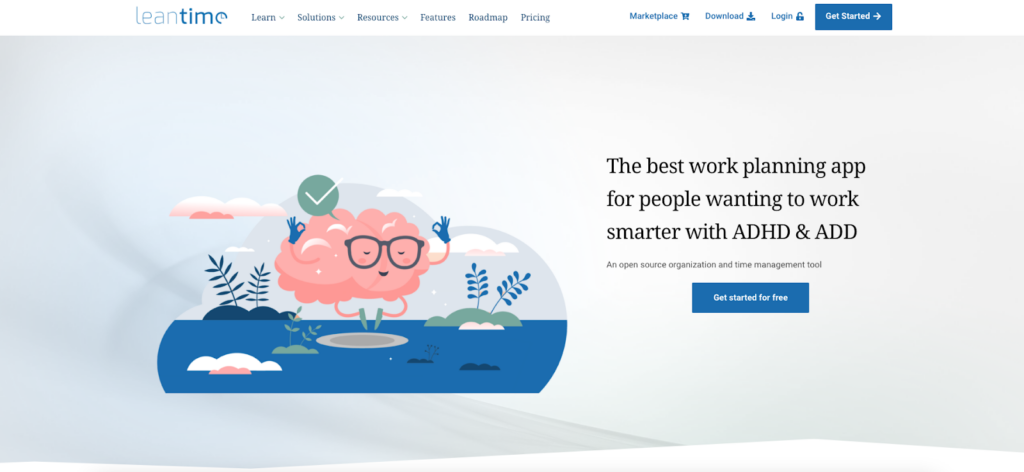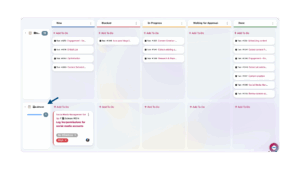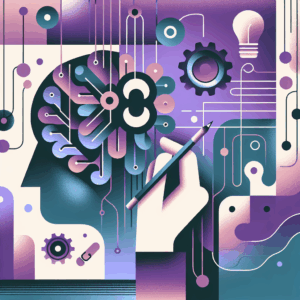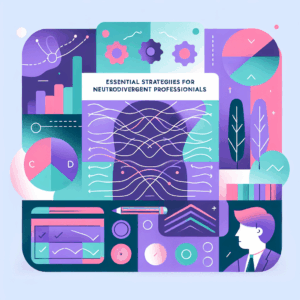Estimated reading time: 9 minutes
ADHD is a common neurodevelopmental condition that affects many people in the modern workplace. Many understand that employees with adult ADHD face unique challenges that can impact their productivity, job satisfaction, and overall well-being.
We’ll explore the specific hurdles many adults with ADHD encounter daily, such as sustaining concentration in a busy environment, poor communication skills, managing time effectively, coping skills, and dealing with distractions.
Table of contents
- Staying Focused with Attention Deficit Hyperactivity Disorder
- Impulsivity and Poor Communication Skills
- Time Management
- Organizational Issues
- Procrastination
- Task Completion
- Hyperfocus
- Restlessness or Hyperactivity
- Emotional Regulation
- Sensitivity to Criticism
- Common Workplace Accommodations for ADHD Employees
- Discovering How Leantime Benefits Individuals with ADHD
- Final Thoughts
Understanding these challenges is the first step towards creating a supportive workspace that empowers all individuals to thrive. It’s important for employers to recognize their workforce’s diverse needs and create an inclusive and understanding work culture that accommodates individuals with ADHD.
Did You Know: The Americans with Disabilities Act protects individuals with ADHD from discrimination in the workplace, making it a valuable asset for those employed by larger companies.
Certainly, individuals with ADHD often face unique challenges in the workplace that can affect their performance and overall job satisfaction.
Here are some common challenges adults with ADHD face at work.
Staying Focused with Attention Deficit Hyperactivity Disorder
Distractions abound in the workplace. Employees with ADHD often find it challenging to maintain focus on a single task for long periods. For example, a graphic designer might start working on a project only to get sidetracked by minor details or unrelated projects, losing hours of productive time. Attention deficit disorder significantly impacts an individual’s ability to maintain focus, making it challenging to stay on task in a busy work environment.
This can lead to missed deadlines and increased stress, affecting overall job performance and satisfaction. Implementing structured intermittent breaks or using tools can help manage this issue.
What this Challenge Looks Like
- • Easily sidetracked by external stimuli, like noises, conversations, or phone notifications
- • Difficulty maintaining focus on longer duties or during meetings
Impulsivity and Poor Communication Skills
Impulsive behavior is common among ADHD employees, causing them to make rash and hasty decisions that could affect their individual and the team’s overall performances. This might manifest in interrupting conversations, making abrupt work-related decisions, or starting new tasks without finishing existing ones.
This impulsiveness can disrupt workflow, strain professional relationships, and result in inconsistent performance.
What this Challenge Looks Like
- • Might speak or act without thinking, potentially leading to misunderstandings or conflicts
- • Often, makes hasty decisions without considering all the implications
Time Management
We all have the same forty hours in our work weeks, but people with Attention Deficit Hyperactivity Disorder often have difficulty with time management. The cause is mainly their brains’ innate tendency to process information non-linearly.
They might underestimate how long a certain task can take, struggle to prioritize effectively, or frequently switch between other tasks, leading to inefficiency and missed deadlines.
For example, A professional might focus intently on perfecting one part of a project, sometimes at the expense of other areas, or may find transitioning between activities challenging, leading to a less structured schedule and some objectives not being met as planned.
What this Challenge Looks Like
- • Struggling with estimating how long a task will take and allocating adequate time for the task
- • Often feeling rushed or frequently running late for work or meetings
Organizational Issues
Someone with ADHD often struggles with organizational issues, which can affect their ability to structure and keep track of tasks and responsibilities. They might have trouble maintaining an orderly workspace, keeping track of documents, or following a consistent routine, leading to neglected deadlines and advanced stress. This can impact their professional performance and create a sense of being overwhelmed by daily demands.
This is not to be tolerated, but helping them organize with the right avenues and tools helps.
What this Challenge Looks Like
- • Difficulty in prioritizing tasks and maintaining an organized workspace
- • Misplacing important documents or forgetting appointments
Procrastination
Procrastination isn’t uncommon among team members who have ADHD. It can be a significant challenge, often from a struggle to initiate or complete tasks due to overwhelming feelings or a lack of immediate motivation. They’re more likely to put off tasks, especially when we don’t communicate urgency and importance well.
This delay in action can lead to a cycle of stress and last-minute rushes to meet deadlines, further exacerbating anxiety and potentially impacting the quality of work and overall well-being.
What this Challenge Looks Like
- • Delaying tasks, especially if they seem overwhelming or uninteresting
- • Difficulty starting tasks even if they’re understood to be important
Task Completion
Task completion can pose a challenge due to difficulty managing complex projects, maintaining concentration and managing time effectively. The tendency to get sidetracked or lose interest before a task is fully completed often results in a trail of unfinished projects, which can lead to feelings of frustration and underachievement. This cycle can affect both personal and professional aspects of life, making it hard to feel a sense of accomplishment.
Completing tasks could be as hard as initiating them for someone with ADHD when leaders don’t communicate the incentive or end goal. Proper guidance and motivation are crucial to help individuals with ADHD carry out tasks effectively and feel a sense of achievement.
What this Challenge Looks Like
- • Challenges with starting new tasks, especially complex ones
- • Leaving tasks unfinished and jumping to the next one

Hyperfocus
Hyperfocus can lead to an intense absorption in specific tasks, often those found particularly interesting or engaging, causing other responsibilities to be neglected. While this deep concentration might seem beneficial, it can disrupt work and personal life balance, leading to overlooked deadlines and tasks.
Understanding and managing this tendency is critical to maintaining overall productivity and responsibility.
What this Challenge Looks Like
- • Becoming so engrossed in one task that they lose track of time or neglect other important tasks
- • Difficulty in transitioning from one task to another
Restlessness or Hyperactivity
Physical and mental restlessness happen very often to someone with ADHD. Restlessness often manifests as a persistent need for movement or difficulty remaining still, making it hard to stay seated or focused for extended periods. It can create challenges in their work environment requiring prolonged attention or inactivity, impacting productivity and the ability to engage in certain tasks effectively.
Giving them the “permitted space” or private office to exercise restlessness could also benefit them and the company.
What this Challenge Looks Like
- • Feeling the need to move around often, which can be challenging in traditional office settings
- • Can come off as restless or anxious during meetings
Emotional Regulation
The truth of the matter is that people with ADHD more often feel more frustrated with their attention and hyperactivity challenges than the people around them. An unaccepting and judgmental space could only trigger that more.
It can be a significant challenge, as it involves managing intense emotions and reactions in various situations. People might experience quick and strong emotional responses, leading to difficulties in maintaining composure in professional settings. This can affect relationships with colleagues and overall work performance, requiring strategies and support to navigate effectively.
What this Challenge Looks Like
- • Might become easily frustrated, overwhelmed, or stressed
- • Challenges in managing and expressing emotions appropriately
Sensitivity to Criticism
Sensitivity to criticism can present a challenge, as even constructive feedback might be perceived as personal or harsh. This heightened reaction can lead to feelings of inadequacy or defensiveness, impacting the ability to learn and grow from feedback. Balancing the delivery and reception of critiques is crucial for maintaining confidence and productivity.
What this Challenge Looks Like
- • May perceive feedback or criticism more intensely, leading to feelings of inadequacy or defensiveness
- • Struggling to separate personal value from professional feedback
Are You Aware: Other ADHD symptoms include attention, hyperactivity, impulsivity, difficulty with time management, and problems with executive functioning.
Common Workplace Accommodations for ADHD Employees

If your business aims to offer suitable adjustments, you can adopt various simple yet effective measures. What measures can you introduce to assist employees dealing with ADHD?
We will explore widely recognized ADHD workplace accommodations that support these employees in fulfilling their critical roles. ADHD accommodations include flexible work schedules, frequent breaks, noise-reduction equipment, written instructions, and many more.
Read More: Mastering Task Management for ADHD
For a complete list of examples and practical advice for implementation, visit Common Workplace Accommodations for ADHD Employees.
Discovering How Leantime Benefits Individuals with ADHD

At Leantime, we’ve long sought a work management system that aids organizations with ADHD. Many existing tools are designed for individual use and lack the necessary information for effective tracking. Identifying a well-balanced solution could empower the over 8 million adults in the US [1] and many more globally, providing them with a resource that enhances their work experience.
Did You Know: Approximately three-quarters of adults with ADHD are likely to experience another mental health disorder, such as anxiety, mood disorders, personality disorder, substance misuse, autism spectrum disorder, or learning differences like dyslexia and dyspraxia. [2]
This led us to develop Leantime, a supportive tool designed specifically for staff with ADHD. As a task and work management platform, it offers numerous features to aid employees with ADHD in several aspects of their work. To be more specific, it contains certain provisions, such as:
- •There are multiple views available for projects to suit individual preferences.
- • A distraction-free dashboard
- • Easy-to-understand Gantt Chart timelines
- • Time blocking tools
- • Easy notes and reminders
- • AI-focused tools that help with ADHD and ADHD
- • And much more
But more than that, we focus on building intrinsic motivation by showcasing the goals, purpose, and relevance of the work each individual is doing. By creating this tool for companies with ADHD employees, we hope to promote more inclusive workplaces and allow people with ADHD to shine.
Leantime is an open-source project management tool that accommodates other members, including those who struggle with Dyslexia.
Final Thoughts
Understanding the challenges ADHD employees face in the workplace is vital for creating an inclusive and supportive work environment. By recognizing their unique needs and implementing appropriate strategies, companies can unlock the full potential of their neurodiverse talent, fostering a more productive and harmonious workplace for all.
The key to achieving greater inclusivity is not to isolate any employee or group of other employees. Instead, it is important to help everyone understand that we are all different and to promote a workplace that values and embraces that uniqueness.
Providing reasonable accommodations for staff members with ADHD may be challenging, particularly in the beginning. However, the benefits for the employees with ADHD and the company will far outweigh the effort required to implement these accommodations.
Valuing success for employees with ADHD benefits the company as a whole and promotes progressiveness.
Resources
[1] Wirth, J. (2023, June 6). ADHD Statistics. Forbes Health. View Resource
[2] Attention deficit hyperactivity disorder in adults – Symptoms, diagnosis and treatment | BMJ Best Practice US. (2023, November 27). View Resource






